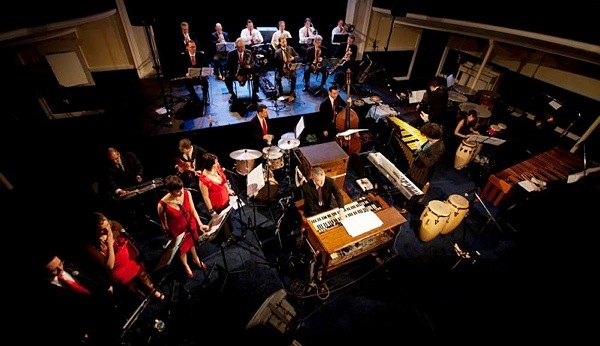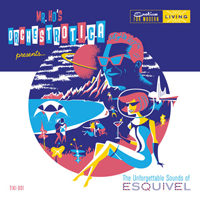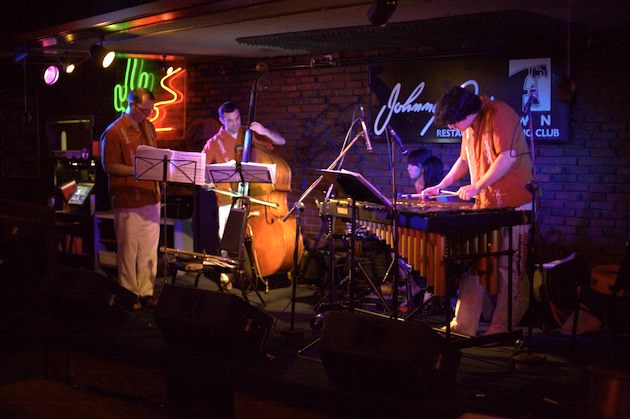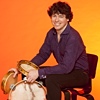Home » Jazz Articles » Interview » Mr Ho's Orchestrotica: Endless Bachelor Party
Mr Ho's Orchestrotica: Endless Bachelor Party

Kitsch? Well, yes. But its rendering is ultra-fine, and the work that goes into producing it is brutal. A kind, funny, happy-go-lucky guy who could be mistaken for a grownup Bobby Brady (except that he was born about 20 years later), O'Neill is all business when he is in the studio.
O'Neill, in addition, sports a smaller unit that plays in clubs—an exotica quartet. If John Zorn is an exotica Picasso, O'Neill is his Georges-Braque counterpart in cubism's transposition to music. Although, like his orchestra, O'Neill's quartet is as fun and relaxing to listen to as quaffing a stiff martini, it is, likewise, complex and serious. As Zorn patches together strands of surf, Latin and "bachelor-pad" music in such bands as The Dreamers, O'Neill breaks up similar stuff and reconstructs it in kaleidoscopic reverie-scapes. More to the point, as Braque may have been the finer cubist, O'Neill may be, in the long run, a stronger exoticist than Zorn.
All About Jazz: There are terms, like exotica, lounge, bachelor-pad— what are some other names for what you do?
Brian O'Neill: A lot of the exotica stuff is "third stream," which is a term that came out of Boston...
AAJ: Alluded to in your upcoming album...
BO: Right. The Third River Rangoon, in May.
AAJ: It's become unpopular to label things lately.
BO: No, I like to label things, actually. Otherwise, people don't have anything to hold onto. I guess if you were really successful you could get away without labeling. If someone doesn't know you, you need something to hold onto. And even though my labels are somewhat niche, enough people know what that is, and the ones that don't, I kind of give them my best explanation...
AAJ: What is exotica?
BO: The classic sound was something that you might hear with a Latin-jazz, typically instrumental quartet in Hawaii or California in the late '50s. The Royal Hawaiian Hilton, I think it was, where Martin Denny—well, Les Baxter was really doing the exotica sound with the large orchestras, and the Hollywood and the fantasy sound, and Martin Denny took it down into a small group setting, so you could actually go play it in bars and restaurants, and so he was the one who first started that trend in Hawaii. But it's not really Hawaiian music. He's a white guy from New York City—a jazz pianist, really. He did have some local people playing in the group. ... But today the concept of exotica is much broader. Anything that falls outside of categorization sometimes falls into it.
AAJ: Avant-garde?
 BO: Not so much the avant-garde jazz thing. Sometimes Sun Ra. How I define it personally often depends on who I'm talking to, if I know what they're into and if I think they'll know what the labels mean. To someone who likes Tiki culture and mid-century music, retro-modern, then exotica means something specific: the Hawaiian stuff, the escapism and all that stuff that's great about Tiki that I really like. But now in my music, I don't tend to do as much as that super- classical sound from the '50s. I like to take just the concept of exotica, which is "exotic" and faraway and not culturally specific to one place. Because exotica was never about authentic music from American Samoa, say. It ripped some stuff off. It's pretty white and, whether that was intentional or not, it kind of became its thing. And I like that idea—even though there's a part of me as a studied musician that's like, "It's this hokey, watered-down, not-legit cha-cha," there's this other side that thinks it's not Cuba I'm thinking of when I listen to this music, it's just this island I can escape to.
BO: Not so much the avant-garde jazz thing. Sometimes Sun Ra. How I define it personally often depends on who I'm talking to, if I know what they're into and if I think they'll know what the labels mean. To someone who likes Tiki culture and mid-century music, retro-modern, then exotica means something specific: the Hawaiian stuff, the escapism and all that stuff that's great about Tiki that I really like. But now in my music, I don't tend to do as much as that super- classical sound from the '50s. I like to take just the concept of exotica, which is "exotic" and faraway and not culturally specific to one place. Because exotica was never about authentic music from American Samoa, say. It ripped some stuff off. It's pretty white and, whether that was intentional or not, it kind of became its thing. And I like that idea—even though there's a part of me as a studied musician that's like, "It's this hokey, watered-down, not-legit cha-cha," there's this other side that thinks it's not Cuba I'm thinking of when I listen to this music, it's just this island I can escape to. I'm a percussionist. I was trained classically and as a big-band drummer. It lets me loosely do whatever I want without alienating everybody. I just throw it under the exotica umbrella. And usually we find a way to make it exotic, whether it's the instrumentation, or music rhythms from another place, or Italian tambourines on a song with Steve Reich influences; and it keeps it fun and light without everything getting too heady. There's enough heady music out there for people who want to get into that. I want people to enjoy and listen to it. Anyone who wants to listen to it can find something deep or shallow—whatever they want to take from it, there's some meat there.
AAJ: Please tell us about your discovery of the music.
BO: I originally played in another exotica group that focused on the classics, covering Martin Denny and so forth. I played with them for three or four years. That was really my introduction. They were looking for a percussionist and someone to do bird calls. I answered the ad, and they sent me the demo, which was a bunch of covers of old recordings. They hadn't even put together a CD yet. But all the tunes had parts for vibraphone, and I play vibraphone. And I found something there that became kind of my own sound now with the Orchestrotica.
AAJ: Would you consider yourself an exotica historian—an "exoticologist"?
BO: I wouldn't call myself that. I know the guy that is, and the guys that have the massive record collections. I feel like I know nothing, compared to them. And there's some I don't care for as much. And now I don't so much study the stuff as use it for inspiration.
AAJ: How about going back to your evolution as an artist?

BO: I was a pianist from about age five to the end of high school. I rode my talent a lot and didn't have to practice that much. I was coasting by the time I got to high school. I ended up working for my piano teacher in high school. She was very technologically advanced at the time, so I'd spend half my time with her, and half the time working with her on her synthesizers and doing a huge amount of theory work.
I was also in the boys' choir and sang about three years in junior high, which was not my favorite thing to do—although now I sing in Spanish with my Mexican roots trio that I play percussion with, La Tuza, which means "mole" in Spanish. On the cover, there's this drawing of a mole going under a fence, to illustrate the metaphor of us taking the music out of Mexico into its new place.
I'm not big on the whole codification of folk styles. They don't tend to have so many rules about how everything has to be done specifically. The kind of music La Tuza plays is called son, which is like a Mexican equivalent of bluegrass. There's very little documentation of it, for example, even on YouTube. There's a whole argument about ownership and interpretation rights—keeping things pure and not watered down and globalized. But to me, there will always be enough people doing that to leave room for the more liberal appropriations we favor.
So, I started playing percussion in junior high school and stopped playing piano, except where I could make a buck doing it here and there at gigs. I majored in percussion studies at Northern Arizona University, which actually has a great jazz program. I focused on drum set in big band and quartets, and classical percussion in the orchestra.
When I moved to Boston in 1999, I sort of worked my way out of the classical setting. If you didn't go to school here, it's a very hard scene to break into: a lot of talent for a limited amount of work.
AAJ: So you moved into your field out of a certain need for survival.
BO: I became a kind of specialist. I've focused lately on playing vibraphone and doing a lot of the hand percussion and multi-percussion stuff.
AAJ: Tell us about your band members, starting with the quartet.

BO: Our flautist, Geni Skendo, is from Albania. Noriko Terada, our drummer, is from Japan, and Jason Davis is our bassist. I met Geni when I was playing here in a southern-Italian band called Newpoli. And Noriko I met through Geni, and then Jason and I played Brazilian music together in a band once. Jason plays seven-string guitar as well as bass: one of the two or three specialists in that area.
AAJ: How do audiences in different contexts respond to exotica?
BO: I find people can connect to it a lot, and I'm not out to baffle people with it. And they may not get all the humor and buried musical jokes, but it's there for people who want to get it.
AAJ: Now your girlfriend, Jennifer, sings in Orchestrotica. Does she play a large role?
BO: No. She's a pretty busy girl, and it's principally my operation. She rallies the troops sometimes.
AAJ: Is it hard to round up 22 musicians?
BO: Yes. You can't imagine. ... I'm very organized, so that helps, but I have to have a spreadsheet for every song, every part, every gig, how much everyone's getting paid...
AAJ: Are you happy?
BO: I'm very happy—happy with the progress of the groups. I took the tack, instead of waiting for three or four years, to record right away with the quartet. I think it really works. It's a little more reading than the musicians are used to, so you have that two or three years of ramp-up time in a few months. And because of that, their own style comes out in the recording.
Selected Discography
Mr. Ho's Orchestrotica, The Unforgettable Sounds of Esquivel (Exotica For Modern Living, 2010)
Photo Credit
Page 1: Kelly Davidson
Page 2: Courtesy of Brian O'Neill
< Previous
Perpetual Motion
Next >
Almost Almond
Comments
About Brian O'Neill
Instrument: Vibraphone
Related Articles | Concerts | Albums | Photos | Similar ToTags
Brian O'Neill
Interview
Gordon Marshall
Braithwaite & Katz Communications
United States
Stan Kenton
john zorn
Sun Ra
Steve Reich
Jason Davis
For the Love of Jazz
 All About Jazz has been a pillar of jazz since 1995, championing it as an art form and, more importantly, supporting the musicians who create it. Our enduring commitment has made "AAJ" one of the most culturally important websites of its kind, read by hundreds of thousands of fans, musicians and industry figures every month.
All About Jazz has been a pillar of jazz since 1995, championing it as an art form and, more importantly, supporting the musicians who create it. Our enduring commitment has made "AAJ" one of the most culturally important websites of its kind, read by hundreds of thousands of fans, musicians and industry figures every month.






















